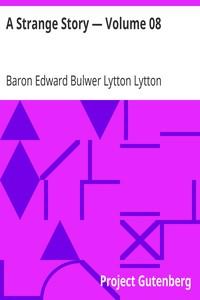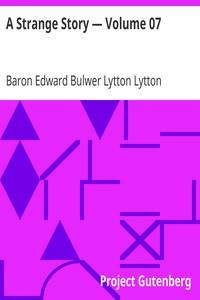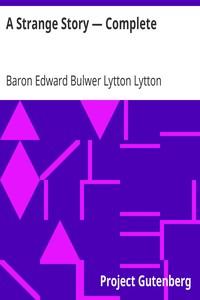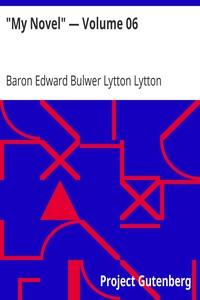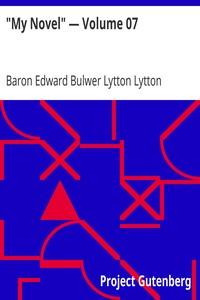Read this ebook for free! No credit card needed, absolutely nothing to pay.
Words: 186095 in 48 pages
This is an ebook sharing website. You can read the uploaded ebooks for free here. No credit cards needed, nothing to pay. If you want to own a digital copy of the ebook, or want to read offline with your favorite ebook-reader, then you can choose to buy and download the ebook.
Last Updated: August 14, 2014
A STRANGE STORY
PREFACE
Of the many illustrious thinkers whom the schools of France have contributed to the intellectual philosophy of our age, Victor Cousin, the most accomplished, assigns to Maine de Biran the rank of the most original.
In the successive developments of his own mind, Maine de Biran may, indeed, be said to represent the change that has been silently at work throughout the general mind of Europe since the close of the last century. He begins his career of philosopher with blind faith in Condillac and Materialism. As an intellect severely conscientious in the pursuit of truth expands amidst the perplexities it revolves, phenomena which cannot be accounted for by Condillac's sensuous theories open to his eye. To the first rudimentary life of man, the animal life, "characterized by impressions, appetites, movements, organic in their origin and ruled by the Law of Necessity," he is compelled to add, "the second, or human life, from which Free-will and Self-consciousness emerge." He thus arrives at the union of mind and matter; but still a something is wanted,--some key to the marvels which neither of these conditions of vital being suffices to explain. And at last the grand self-completing Thinker attains to the Third Life of Man in Man's Soul.
"There are not," says this philosopher, towards the close of his last and loftiest work,--"there are not only two principles opposed to each other in Man,--there are three. For there are in him three lives and three orders of faculties. Though all should be in accord and in harmony between the sensitive and the active faculties which constitute Man, there would still be a nature superior, a third life which would not be satisfied; which would make felt the truth that there is another happiness, another wisdom, another perfection, at once above the greatest human happiness, above the highest wisdom, or intellectual and moral perfection of which the human being is susceptible."
Now, as Philosophy and Romance both take their origin in the Principle of Wonder, so in the "Strange Story" submitted to the Public it will be seen that Romance, through the freest exercise of its wildest vagaries, conducts its bewildered hero towards the same goal to which Philosophy leads its luminous Student, through far grander portents of Nature, far higher visions of Supernatural Power, than Fable can yield to Fancy. That goal is defined in these noble words:--
"The relations which exist between the elements and the products of the three lives of Man are the subjects of meditation, the fairest and finest, but also the most difficult. The Stoic Philosophy shows us all which can be most elevated in active life; but it makes abstraction of the animal nature, and absolutely fails to recognize all which belongs to the life of the spirit. Its practical morality is beyond the forces of humanity. Christianity alone embraces the whole Man. It dissimulates none of the sides of his nature, and avails itself of his miseries and his weakness in order to conduct him to his end in showing him all the want that he has of a succor more exalted."
In the passages thus quoted, I imply one of the objects for which this tale has been written; and I cite them, with a wish to acknowledge one of those priceless obligations which writings the lightest and most fantastic often incur to reasoners the most serious and profound.
But I here construct a romance which should have, as a romance, some interest for the general reader. I do not elaborate a treatise submitted to the logic of sages. And it is only when "in fairy fiction drest" that Romance gives admission to "truths severe."
I venture to assume that none will question my privilege to avail myself of the marvellous agencies which have ever been at the legitimate command of the fabulist.
To the highest form of romantic narrative, the Epic, critics, indeed, have declared that a supernatural machinery is indispensable. That the Drama has availed itself of the same license as the Epic, it would be unnecessary to say to the countrymen of Shakspeare, or to the generation that is yet studying the enigmas of Goethe's "Faust." Prose Romance has immemorially asserted, no less than the Epic or the Drama, its heritage in the Realm of the Marvellous. The interest which attaches to the supernatural is sought in the earliest Prose Romance which modern times take from the ancient, and which, perhaps, had its origin in the lost Novels of Miletus; and the right to invoke such interest has, ever since, been maintained by Romance through all varieties of form and fancy,--from the majestic epopee of "Telemaque" to the graceful fantasies of "Undine," or the mighty mockeries of "Gulliver's Travels" down to such comparatively commonplace elements of wonder as yet preserve from oblivion "The Castle of Otranto" and "The Old English Baron."
Free books android app tbrJar TBR JAR Read Free books online gutenberg
More posts by @FreeBooks
